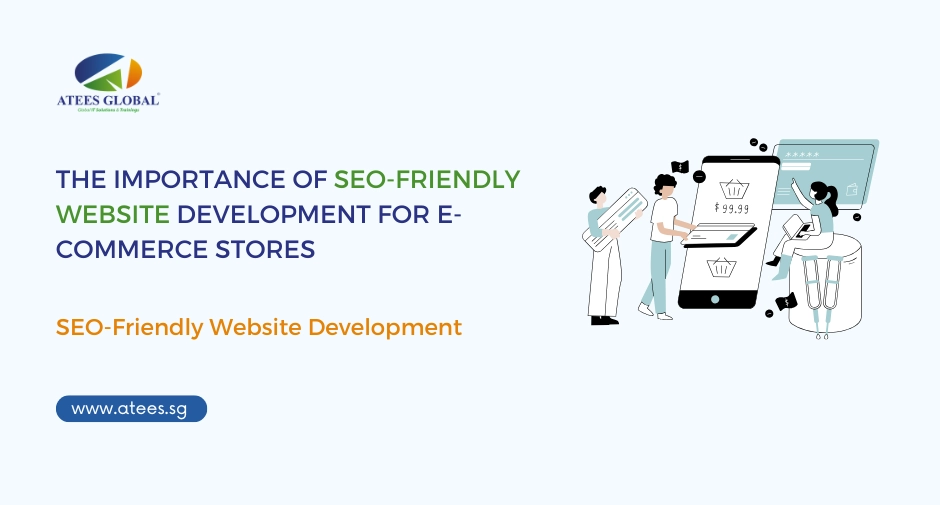In the highly competitive world of e-commerce, having an appealing and functional website is not enough. Success in this space requires visibility, which is where SEO-friendly website development becomes crucial. An optimized website helps e-commerce businesses attract organic traffic, improve user experience, and ultimately drive more sales.
Why SEO-Friendly Website Development Matters for E-Commerce
1. Increases Organic Traffic
Organic traffic is defined as users who found your website through unpaid search results. An SEO-optimized e-commerce site appears higher in search engine results, making it simpler for prospective buyers to find your items.
Key Benefit:
- More visibility leads to increased website traffic without relying heavily on paid advertising.
2. Improves User Experience
SEO and UX work hand in hand. A well-optimized site provides faster loading times, mobile responsiveness, and user-friendly navigation, all of which are important for both users and search engines.
Key Benefit:
- Improved user experience results in higher engagement, lower bounce rates, and increased conversions.
3. Builds Brand Credibility
Higher ranks in search engine results promote not just visibility but also reputation for your brand. Customers are more likely to trust e-commerce sites that appear on the first page of search results.
Key Benefit:
- Establishes trust and encourages repeat customers.
4. Supports Long-Term Growth
Unlike paid ads, which require ongoing investment, SEO offers sustainable growth. Once your website is optimized, it can continue to attract traffic and generate sales over time.
Key Benefit:
- The cost-effective long-term strategy for e-commerce businesses.
Key Features of SEO-Friendly Website Development
To achieve optimal SEO performance, certain elements must be integrated during the e-commerce website development process:
1. Mobile Responsiveness
With the majority of customers buying via mobile devices, having a mobile-friendly website is critical. Google also favors mobile-first indexing, which means that it ranks and indexes websites largely through their mobile versions.
Why It Matters:
- Ensures your website looks and functions perfectly on all screen sizes.
2. Site Speed Optimization
Page load speed is an important consideration for both user experience and SEO. Slow-loading websites can annoy users and lead to greater bounce rates.
How to Improve Site Speed:
- Optimize images, leverage browser caching, and use Content Delivery Networks (CDNs).
3. URL Structure and Navigation
A clear, meaningful URL structure helps search engines grasp the content of your sites. Similarly, straightforward navigation guarantees that consumers may quickly discover what they are searching for.
Best Practices:
- Use keyword-rich URLs and a clear hierarchy for menus and categories.
4. On-page SEO Elements
These elements include title tags, meta descriptions, headers, and picture alt text. Each of these components should be optimized for relevant keywords.
Why It’s Important:
- Helps search engines understand the content and relevance of your pages.
5. Secure and Accessible Website
An HTTPS-secured website not only protects user data but is also a ranking factor for Google.
Benefit:
- Builds trust with customers and improves search rankings.
The significance of SEO in website design for e-commerce
SEO should not be an afterthought but an integral part of your website’s design and development. Here’s why:
1. SEO-optimized design increases rankings
A website created with SEO in mind makes it easy for search engine crawlers to explore and index the content. Every piece, from organized data to optimized media, helps to improve rankings.
Example:
- Using schema markup helps search engines display rich snippets, enhancing click-through rates.
2. Improved Load Times with SEO-Focused Design
An SEO-friendly design stresses performance. Features like as lazy image loading and smart coding methods guarantee that your site loads swiftly.
Impact:
- Faster load times improve user satisfaction and increase chances of conversion.
3. Improved Mobile Experience
Mobile-first indexing combines SEO with mobile design. A mobile-optimized e-commerce site offers a smooth purchasing experience, which improves rankings and sales.
Best Practices for SEO in E-Commerce Stores
SEO for e-commerce stores entails numerous strategies:
1. Keyword Research and Implementation
Identify high-traffic, low-competition keywords for your items and use them in your content, product descriptions, and meta tags.
Tools to Use:
- Google Keyword Planner, SEMrush, or Ahrefs for effective keyword research.
2. Content Marketing
Create valuable content like blogs, how-to guides, and product comparisons to attract and engage your target audience.
Why It Works:
Content marketing increases organic traffic and positions your company as an expert in your area.
3. Technical SEO Audits
Conduct technical audits on a regular basis to ensure that there are no issues affecting the performance or crawlability of your website.
Key Focus Areas:
Focus areas include fixing broken links, optimizing XML sitemaps, and ensuring correct use of canonical tags.
4. Local SEO
For businesses targeting specific regions, optimizing for local SEO can help them rank in local searches.
How To Optimize:
Add your business to Google My Business and use location-specific keywords.
Partnering with a Digital Marketing Agency in Singapore
Working with a Digital Marketing Agency in Singapore guarantees that your e-commerce business is optimized for performance and exposure.
1. Expertise in SEO and Web Development
Agencies have specialist teams who understand the newest SEO tactics and web development techniques, offering a comprehensive approach to website optimization.
2. Strategies tailored to your business
They provide tailored solutions depending on your company objectives, target audience, and industry.
3. Continuous Monitoring and Improvement
A professional firm will monitor your website’s performance and make any required changes to keep it optimal as search engine algorithms improve.
In today’s digital era, SEO-friendly website construction is critical to the success of e-commerce websites. By incorporating SEO into your website’s design and functioning, you may enhance search engine rankings, attract organic visitors, and boost sales.
Whether you’re just getting started or want to improve your current e-commerce store, working with a Digital Marketing Agency in Singapore, SEO Services in Singapore, or a Website Development Company in Singapore will help you reach your company objectives.








